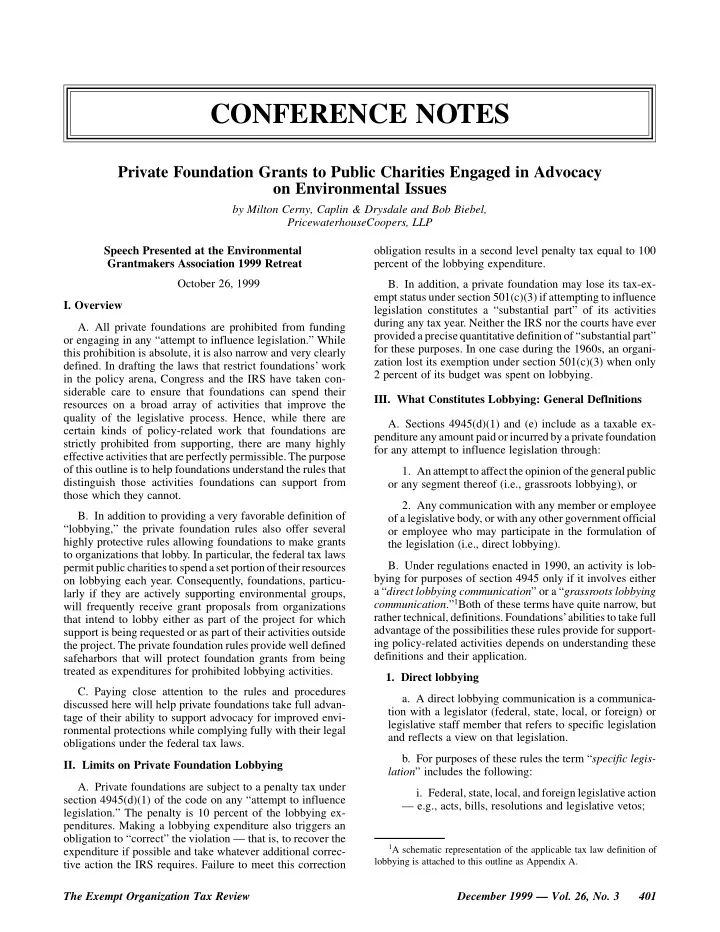

CONFERENCE NOTES Private Foundation Grants to Public Charities Engaged in Advocacy on Environmental Issues by Milton Cerny, Caplin & Drysdale and Bob Biebel, PricewaterhouseCoopers, LLP obligation results in a second level penalty tax equal to 100 Speech Presented at the Environmental percent of the lobbying expenditure. Grantmakers Association 1999 Retreat October 26, 1999 B. In addition, a private foundation may lose its tax-ex- empt status under section 501(c)(3) if attempting to influence I. Overview legislation constitutes a “substantial part” of its activities during any tax year. Neither the IRS nor the courts have ever A. All private foundations are prohibited from funding provided a precise quantitative definition of “substantial part” or engaging in any “attempt to influence legislation.” While for these purposes. In one case during the 1960s, an organi- this prohibition is absolute, it is also narrow and very clearly zation lost its exemption under section 501(c)(3) when only defined. In drafting the laws that restrict foundations’ work 2 percent of its budget was spent on lobbying. in the policy arena, Congress and the IRS have taken con- siderable care to ensure that foundations can spend their III. What Constitutes Lobbying: General Deflnitions resources on a broad array of activities that improve the quality of the legislative process. Hence, while there are A. Sections 4945(d)(1) and (e) include as a taxable ex- certain kinds of policy-related work that foundations are penditure any amount paid or incurred by a private foundation strictly prohibited from supporting, there are many highly for any attempt to influence legislation through: effective activities that are perfectly permissible. The purpose of this outline is to help foundations understand the rules that 1. An attempt to affect the opinion of the general public distinguish those activities foundations can support from or any segment thereof (i.e., grassroots lobbying), or those which they cannot. 2. Any communication with any member or employee B. In addition to providing a very favorable definition of of a legislative body, or with any other government official “lobbying,” the private foundation rules also offer several or employee who may participate in the formulation of highly protective rules allowing foundations to make grants the legislation (i.e., direct lobbying). to organizations that lobby. In particular, the federal tax laws B. Under regulations enacted in 1990, an activity is lob- permit public charities to spend a set portion of their resources bying for purposes of section 4945 only if it involves either on lobbying each year. Consequently, foundations, particu- a “ direct lobbying communication ” or a “ grassroots lobbying larly if they are actively supporting environmental groups, communication .” 1 Both of these terms have quite narrow, but will frequently receive grant proposals from organizations rather technical, definitions. Foundations’abilities to take full that intend to lobby either as part of the project for which advantage of the possibilities these rules provide for support- support is being requested or as part of their activities outside ing policy-related activities depends on understanding these the project. The private foundation rules provide well defined definitions and their application. safeharbors that will protect foundation grants from being treated as expenditures for prohibited lobbying activities. 1. Direct lobbying C. Paying close attention to the rules and procedures a. A direct lobbying communication is a communica- discussed here will help private foundations take full advan- tion with a legislator (federal, state, local, or foreign) or tage of their ability to support advocacy for improved envi- legislative staff member that refers to specific legislation ronmental protections while complying fully with their legal and reflects a view on that legislation. obligations under the federal tax laws. b. For purposes of these rules the term “ specific legis- II. Limits on Private Foundation Lobbying lation ” includes the following: A. Private foundations are subject to a penalty tax under i. Federal, state, local, and foreign legislative action section 4945(d)(1) of the code on any “attempt to influence — e.g., acts, bills, resolutions and legislative vetos; legislation.” The penalty is 10 percent of the lobbying ex- penditures. Making a lobbying expenditure also triggers an obligation to “correct” the violation — that is, to recover the 1 A schematic representation of the applicable tax law definition of expenditure if possible and take whatever additional correc- lobbying is attached to this outline as Appendix A. tive action the IRS requires. Failure to meet this correction The Exempt Organization Tax Review December 1999 — Vol. 26, No. 3 401
Recommend
More recommend